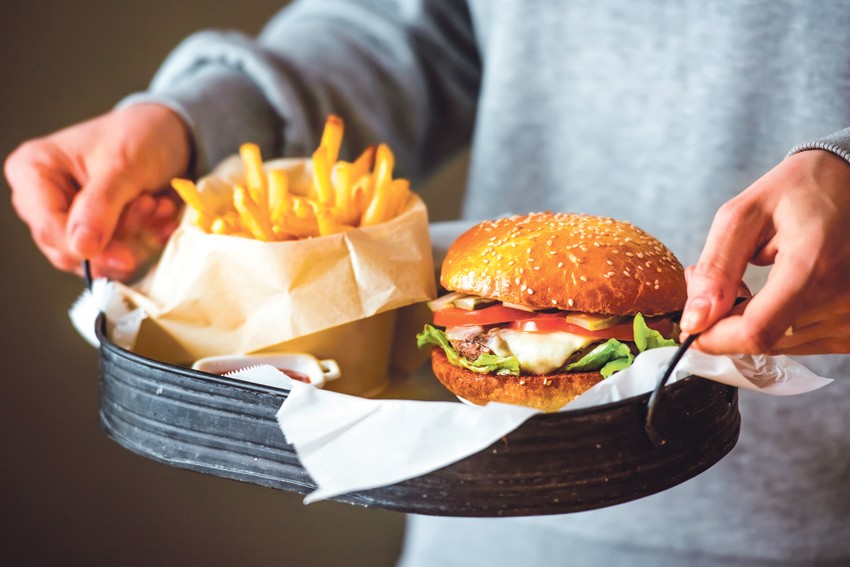Burger wars

For decades, ‘the hamburger’ represented all the things sophisticates loathe about the United States; it is unhealthy and mass-produced, the product of exploited animals and workers.
Yet among the affluent and trendy, burgers are more popular now than ever. Not Whoppers or Big Macs, mind, but exquisite creations made from the finest ingredients, served with hand cut chips, exotic sauces and craft beer. Burgastronomy, Fancy Burger, Nordburger, Burger Theory, Burger Foundry – the list never seems to end. Highfalutin burger joints are having their moment, like the sushi trains and juice bars of yesteryear. Never before have there been so many opportunities to spend exorbitant amounts of money on meat in bread. Rowan Mein, co-founder of Burger Addiction in Rundle Place, started his eatery to “make a large range of awesome burgers, with everything made fresh in store daily”. “Everyday,” he says, “we made all the sauces, patties and chips. It was great.” Mein eventually left the business and predicts that “soon there will be fewer gourmet burger places. Because of financial pressures, some are really starting to decline in quality and reputation.” One of the biggest financial pressures on these burger places is the staggering volume of competitors, made even more trying by the arrival of Melbourne chain Grill’d. Grill’d presents itself as an authentic, boutique restaurant, but this is down to excellent marketing rather than reality. It was founded by a marketing executive, rather than a chef, and started up with the financial backing of executives from Foster’s and Boost Juice. Although the pressures of the market may soon force some of the smaller burger suppliers to close, the gourmet burger market is still booming. Twenty-to-30-year-olds are the prime burger buying demographic (sufficiently wealthy and independent to eat out, but insufficiently afraid of death to eat healthily), and they are increasingly abandoning traditional fast food outlets. McDonald’s, for example, suffered their sharpest decline in sales in a decade last August. Their profits have continued to shrink this year. The big players are trying to get into the game, though with varying levels of success. In an attempt to add some modish ‘slow cooking’ to their fast food menu, Hungry Jack’s now offer a pulled beef burger. The response on their Facebook page has been almost entirely vitriolic, with customers offended that the burger doesn’t meet the high standards they’ve come to know and love from HJs. Top responses to the pulled beef burger include: “a pile of slop”, “disappointment in a bun”, and “you should be prosecuted”. Matt Preston, eat your heart out. Oporto has been more successful with their new ‘burgercraft collective’ selections, though their attempts have nevertheless been awkward. They’ve just started offering an aioli burger served on a square bun (it’s both literally and figuratively edgy), in a campaign emphasising that their artisanal burgers are ‘hand-crafted’, which does beg the question: how are the other items of the menu made, if not by hand? But it is McDonald’s, with its dominant market share and its comparatively upmarket pretensions, that has the most to lose from the growth of gourmet, and so it is McDonald’s that is investing the most money in winning back its market. Currently, they’re rolling out ‘Create Your Taste’, a new touchscreen system where the customer is given total freedom of choice when making their own burger, with access to new, hoity toity ingredients. I recall that 10 years ago, while I worked as a McDonald’s kitchen-hand, I witnessed the worries the company faced after Super Size Me came out. Quick as a flash, McDonald’s started to sell itself as a healthy restaurant complete with posters and pamphlets explaining that McDonald’s was, despite what ‘you might have heard’, actually good for you. It was ridiculous, but it worked. The storm was weathered and the market share recovered. If you look back at the history of the business, McDonald’s has overcome, on average, one existential crisis per decade. Mein (née Burger Addiction) does not believe that, in the way their business is structured, McDonald’s can break into the premium burger market, believing that “they simply cannot make a product of a high enough quality to compete”. He may be right, but who knows? Robert Frost wrote, “nothing gold can stay”, though he didn’t know then about those tenacious golden arches.